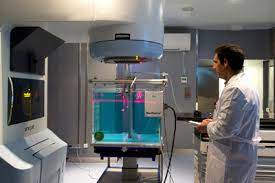Medical physics refers to the practice of applying physics to medicine. A professional with a degree in that field has many opportunities in workplaces like medical schools, hospitals, and clinics. Some technical foundations that result from this practice are areas like radiology, radiation oncology, and nuclear medicine. In this article, we discuss nine jobs that you can pursue with a medical physics degree.
Recommended
9 medical physics degree jobs
Someone with a medical physics degree completed courses that focused on the application of physics, nuclear science, and engineering physics to diagnose, treat, and create therapeutic processes for public health protection. They work in health care and use their knowledge to help patients by developing and using medical radiation treatments, devices, and technologies. Here are nine jobs you can pursue with a medical physics degree:

1. Clinical laboratory scientist
National average salary: $23,424 per year
Primary duties: A clinical laboratory scientist primarily works in hospitals and other medical settings. They use lab equipment to analyze various samples in search of abnormalities and their causes. When working with blood, they assess the quality of transfusions and analyze it for illnesses like immunodeficiency or leukemia. Maintaining safety protocols and documenting their discoveries in the lab are crucial aspects of their role. A clinical laboratory scientist also provides other physicians with information on test results and supervises other laboratory personnel.
2. Medical physics faculty
National average salary: $52,921 per year
Primary duties: A person in a medical physics faculty position handles quality assurance, machine calibration, and maintenance and gives support for special procedures, like stereotactic radiosurgery and thermal therapy. They develop new safety procedures, consult with their other physician colleagues, and research new treatment options for illnesses such as cancer and heart disease. Teaching and training future medical physicists, residents, and medical students are also part of their primary duties.
3. Postdoctoral fellow
National average salary: $53,941 per year
Primary duties: A postdoctoral fellow develops and implements human research laboratory experiments, troubleshoots and customizes experimental tools to respond to research questions, and combines resources to complete research plans. They present their research results at meetings and attend research seminars. Reviewing literature, analyzing data, recording notes, publishing information, and communicating ideas and results with colleagues are also part of their primary duties.
RECOMMENDED: TOP 30 ONLINE FIRE SCIENCE DEGREE PROGRAMS
4. Research associate
National average salary: $55,855 per year
Primary duties: A research associate performs many activities related to medical research, particularly in clinical trials. They set up trials to conduct their research studies, design materials for trials, and ensure that all the trial centers have enough supplies. Preparing final reports and manuscripts for publications, collecting completed case reports from medical facilities, closing down trial centers once the staff has completed trials, and discussing the results of trials are other aspects of their primary duties.
5. Auditor
National average salary: $56,585 per year
Primary duties: An auditor conducts internal and external reviews of coding accuracy, policies, and procedures. The reviews help determine an organization’s efficiency and ensure operations are free of liability. They have knowledge and skills in medical coding and terminology, clinical documents, and compliance and regulatory guidelines. During an audit, auditors compile data, report findings, and provide suggestions for improved business operations and staff training. People in this profession also work to find overpayments by the organization or patients and identify reimbursement shortages.
6. Medical technologist
National average salary: $88,336 per year
Primary duties: A medical technologist is usually a highly skilled health professional who tests several aspects of the human body, such as blood, tissue samples, and other bodily fluids. Responsibilities include operating and maintaining the equipment they use for analyzing samples. They also ensure the staff completes the tests correctly and in a timely manner. A medical technologist can work in different concentrations, like immunology, microbiology, genetics, histology, hematology, chemistry, toxicology or blood banking. Similarly, they can explore two branches of pathology, either clinical or anatomical. Clinical involves analyzing the bodily fluid, while anatomical analyzes the bodily tissue.
7. Scientist
National average salary: $88,778 per year
Primary duties: A scientist with a medical physics degree conducts research for the overall improvement of human health using clinical trials and other methods to reach their findings. It’s important they follow procedures to minimize the risks of contamination and maintain safety standards. Other duties they have include standardizing the potency of drugs, doses, and methods to allow drug manufacturing companies to create and distribute the products. Additionally, they form partnerships with health departments, industry personnel, and physicians to develop programs that improve health outcomes. They also research and write grant proposals to apply for government or private funding.
8. Nuclear medicine technologist
National average salary: $90,374 per year
Primary duties: A nuclear medicine technologist works with trained physicians to perform nuclear imaging tests. They also work with patients to determine how radioactive treatments affect their organs and tissues and diagnose them by using imaging equipment. Some of their other duties include keeping a detailed record of medical procedures preparing radioactive drugs and administrating them to their patients. They also follow medical safety guidelines when either they or their patients are exposed to radiation. A nuclear medicine technologist may also play a role as an emergency responder in the event of a nuclear disaster.
9. Radiation therapist
National average salary: $100,963 per year
Primary duties: A radiation therapist is part of the oncology team that cares for cancer patients and people with other illnesses by administering radiation treatment. Their primary duties include explaining treatment plans to patients, answering questions they might have, and locating the exact location that requires treatment. It’s critical they protect themselves and their patients from improper radiation exposure, which can happen when someone performs exams without clinical justification or uses an unnecessary amount of radiation for imaging. They also keep detailed records of their patients and monitor them for any unusual reactions to the treatments.
I hope you find this article helpful.